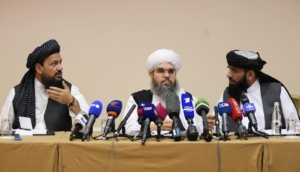
Media law sparks ‘terrorist’ absurdity at Taliban talks

The withdrawal of U.S. forces appears to have reignited Afghanistan’s civil war and could even return the Taliban to power — but the Kremlin has prepared for such an eventuality by cultivating a relationship with the Taliban. The arrival of a Taliban delegation in Moscow for talks Thursday could hardly be more serious, but Russian laws requiring the media to use formal labels like ‘terrorist’ and ‘extremist’ in their reporting turned the visit into something of a joke.
- The Taliban officials met the presidential envoy to Afghanistan in Moscow and held an hour-long press conference Friday that was hosted by state news agency TASS. The Taliban promised they wouldn’t try to cross Afghanistan’s borders with its Central Asian neighbors and pledged to fight against the drug trade and keep militant groups Al-Qaeda and ISIS out of Afghanistan.
- There’s little point in criticizing Russia for talking to the Taliban – this isn’t the U.S., and Russia is separated from Afghanistan by just the porous borders of other Central Asian countries (which have visa-free agreements with Russia). Whether Taliban officials should be publicly invited to high-level talks, however, is a different matter — and it’s worth noting that Foreign Minister Sergey Lavrov, who met with the Taliban in 2018 and 2019, was not present this time.
- But it wasn’t the talks that prompted hilarity — rather new media laws that obliged journalists to label the Taliban as a terrorist organization in every article and news report. This is required under a Russian law that came into force this month stipulating media outlets must identify organizations as terrorists or extremists if they are officially designated as such. As a result, state news agencies published grotesque reports, for example: “A delegation from the Taliban movement (a terrorist organization prohibited in Russia) met with Russia’s presidential envoy to Afghanistan”.
- The Foreign Ministry found the neatest solution: although it’s not a media outlet and, therefore, not officially required to comply with the media law, the ministry’s website subtly re-named its guests: the ‘Taliban’ became the ‘Talib movement’.
- Opposition figures were quick to highlight the absurdity. Laws passed this spring prevent anyone from standing for public office if they have links to terrorist or extremist organizations – and Lavrov was recently named one of the top three candidates on United Russia’s electoral list. A candidate in September elections from the liberal Yabloko Party, Marina Litvinovich, duly filed a petition Friday with the Central Election Commission demanding Lavrov be disqualified from elections for being an associate of a terrorist organization.
- This media law was, of course, introduced with a specific aim: to discredit opposition leader Aleksei Navalny and prevent him or his supporters from standing in elections. Navalny’s Anti-Corruption Foundation was designated an extremist organization earlier this year meaning that, in effect, Navalny has the same status as the Taliban. The only difference is that Navalny’s supporters do not get meetings with Russian officials. Media outlet Meduza published an amusing table about the similarities and differences between the two groups.
Why the world should care: Despite talk of the ‘power vertical’, a feature of Russian government is a lack of unified policymaking. And that means parliament can pass extremism laws to bar Navalny supporters from elections while the Foreign Ministry engages in realpolitik with terrorists.




